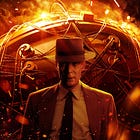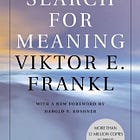This article is a new installment in a series of “mini reviews” of my reading. Previous installments in the series, along with other compilations, appear below:
2023: Third Quarter • Second Quarter • First Quarter
2022: Fourth Quarter • Third Quarter • Second Quarter • First Quarter
2021: Fourth Quarter • Third Quarter
2020: Complete Reading List • Summer Book Recommendations
2019: Holiday Book Recommendations
2018: Holiday Book Recommendations
American Prometheus
Author: Kai Bird and Martin Sherwin
Year of Publication: 2006
Length: 599 pages
Two movies were released on July 21, 2023: Barbie and Oppenheimer. Normally studios planning releases attempt to avoid release dates that coincide with competing films. Presumably, the audiences for Barbie and Oppenheimer are different demographically, but the simultaneous release of two blockbusters on the same day led to a strange cultural phenomenon known as Barbenheimer. I’m not sure how many people actually saw both films as a “double feature” but stranger things have happened.
I had no interest in seeing Barbie but Oppenheimer seemed interesting. However, I decided to read the definitive biography of J. Robert Oppenheimer before going to the movie. I finished the book days before the film disappeared from the theaters after a very long run. I feel like my understanding of the film, especially its more intricate plot lines, would have been very limited without reading the book first.
The story of Robert Oppenheimer holds lessons for us today. It is unfair to regard an individual’s political views as completely static over the course of a lifetime. As an individual goes through life, beliefs naturally change and evolve. Oppenheimer’s naive association with the left as a young man in the 1930s was used against him by political enemies two decades later despite scant evidence of disloyalty and ignoring his many contributions to the United States during the Second World War.
I wrote a review of the book in October which goes into much more detail:
Travels with Charley in Search of America
Author: John Steinbeck
Year of Publication: 1962
Length: 210 pages
I have read Travels with Charley several times in my life. It is a great book to read in the fall since that is when John Steinbeck went on his famous journey. I last read the book in the third quarter of 2021 and will repeat the comments that I made at that time.
I’ve read a number of Steinbeck’s books this year but when my summer travel plans were ruined by fires in California, I decided to re-read an old travel favorite.
In the fall of 1960, John Steinbeck embarked upon a ten thousand mile adventure in a three-quarter ton pickup truck equipped with a camper. He was a man getting on in years accompanied by Charley, his dog, who was getting on in years. The narrative is a travel story but infused with Steinbeck’s skeptical views regarding modernity. He tried to stay on the backroads, avoiding the new turnpikes where everything was becoming homogenized.
The story ends as Steinbeck aborts his leisurely trip and drives straight back to his home in New York, disgusted by the racism he saw in the Deep South. Ever since I first read this book decades ago, I have wanted to explore America in a truck camper.
Two years later, I have yet to explore America in a truck camper. Maybe someday.

Elon Musk
Author: Walter Isaacson
Year of Publication: 2023
Length: 617 pages
I have read several of Walter Isaacson’s books over the years. Leonardo da Vinci, which I recommended in 2018, remains my favorite. While I enjoyed reading Isaacson’s biography of Elon Musk, it fell short of his prior books in terms of quality. The large number of very short chapters felt like a collection of blog posts rather than a cohesive narrative. However, I have a great deal of sympathy for Isaacson who wrote a biography about a man who is nowhere near the end of his career and continues to make news nearly every week. It is an almost impossible task.
In my opinion, the book is worth reading if you have an interest in Musk’s career and want to get a better sense of his personality. One benefit of the short chapters is that you can keep the book on your coffee table or nightstand and read a chapter in a few minutes when you have a small amount of spare time.
I wrote up some brief thoughts about the biography in The Digest #174 in November:
Montaigne: A Biography
Author: Donald Frame
Year of Publication: 1965
Length: 328 pages
I first read Michel de Montaigne’s essays in late 2018 and early 2019. Montaigne was born in 1533 in the Bordeaux region of France. As a member of a wealthy Catholic family, Montaigne received a classical education. Interestingly, his native language was Latin since French was prohibited in his household until the age of six. After a brief career in public service, Montaigne retired to the family estate at the age of thirty-eight to devote himself to various intellectual pursuits.
Donald Frame was one of the most highly regarded translators of Montaigne’s work. When I started re-reading Montaigne’s essays, I noticed that Frame had written a Montaigne biography in 1965. Although the book is out of print and used copies are expensive, I located a copy and read it. Reading a biography is not necessary to benefit from Montaigne’s essays but I feel like I now have a better understanding of the man.
Man’s Search for Meaning: Young Adult Edition
Author: Viktor Frankl
Year of Publication: 1946
Length: 159 pages
This is the third time that I have read Viktor Frankl’s book about his experience in concentration camps during the Second World War. I wrote about the book at length in an article published in 2020. I was inspired to read the book again this fall due to the terrorist attacks against Israel on October 7 and the rise of antisemitism that has been seen throughout the world since then.
The book has a powerful narrative that transcends Frankl’s direct experiences in the camps and contains a profound message about how we should strive to behave under conditions of extreme suffering. Frankl was a neurologist and psychiatrist. The second part of the book describes his therapeutic doctrine known as logotherapy.
The young adult edition contains the full account of Frankl’s experiences in the concentration camp along with an abridged account of logotherapy. In my opinion, the book will be highly disturbing for most pre-teens but could be appropriate for mature and well-adjusted teenagers. I would suggest that anyone contemplating a gift of this book to a young person should read it first themselves and consider whether the young adult is psychologically ready for such a traumatic subject. It’s not an appropriate book to just send to a young person who you do not know very well.
The Great Conversation: The Substance of a Liberal Education
Author: Robert M. Hutchins
Year of Publication: 1952
Length: 132 pages
Robert M. Hutchins makes a forceful case for pursuing the great books throughout life. In his view, education is not something that children and young adults should aim to plod through before entering the “real world.” Education should be pursued throughout life because the human experiences we encounter as we mature naturally lead us to see new things in texts that we have read in the past. For example, a sixteen year old reading Tolstoy’s Anna Karenina will have less of an appreciation for the message than a forty year old who has experienced marriage and children.
I wrote a review of the book earlier this month:
The Reason for God
Author: Timothy Keller
Year of Publication: 2008
Length: 254 pages
I read Timothy Keller’s book, Making Sense of God, in July and wrote about it in my third quarter compilation of books. Keller, who died earlier this year, was a pastor and co-founder of a church in New York City that grew to serve thousands of people. Keller had relatively orthodox beliefs about Christianity which made the growth of his church in one of the most secular cities in the world even more impressive.
While Making Sense of God was more directly aimed at skeptics and meant as a companion to a podcast series, The Reason for God goes into more details regarding the reasons for faith. Both books address skeptics at length so there is some overlap in his arguments. Keller has a way of upholding his orthodox views of Christianity while not trivializing the views of skeptics. There’s no doubt that he’s trying to convince the reader of the truth of Christianity, but he does this with a sense of humility.
From an agnostic perspective, Keller gave me some interesting topics to think about. For example, why would the accounts of the resurrection of Jesus Christ have made the first witnesses women who had far lower social status than men? This would hurt the credibility of the story if it was in fact just a fabricated tale. And why did large numbers of people who would have been naturally skeptical of the resurrection suddenly believe? Of course, there can be no “proof” of the resurrection or religious belief in general, but I found the arguments intellectually interesting to contemplate.
The Daily Stoic
Author: Ryan Holiday
Year of Publication: 2016
Length: 405 pages
This book is a collection of quotes from famous stoics followed by Ryan Holiday’s commentary regarding the quote. There is an entry for every day of the year and that is how it is designed to be read. I started reading the book in January and will finish on December 31. While many of the quotes are ones that I am already familiar with, it was nice to start each day with some stoic wisdom.
Holiday provides his interpretation of each quote and he has a good grounding in the overall philosophy of stoicism. This does not mean that I always agree with all of his opinions or advice, but for the most part I like his focus on taking action in the present moment to improve our lives and to live honorably and well.
There is plenty of space at the bottom of most entries to write your own thoughts if you would like to. I often found myself copying the quotation into my morning pages journal and writing some reflections on its meaning. A nice way to start the day.
A Calendar of Wisdom
Author: Leo Tolstoy
Year of Publication: 1910
Length: 378 pages
At the age of 73, Leo Tolstoy started to obsessively focus on “collecting the wisdom of the centuries in one book.” Tolstoy first dreamt about putting together a collection in the mid 1880s when he decided that he had to “create a circle of reading for myself: Epictetus, Marcus Aurelius, Lao-Tzu, Buddha, Pascal, The New Testament.”
Tolstoy’s ambition was realized in three editions of A Calendar of Wisdom published between 1904 and 1910. Tolstoy was a lifelong learner and never stopped thinking, reading, and writing, so perhaps there would have been additional editions of the book if he had not died of pneumonia in 1910 at the age of 82.
For each day of the year, the reader is presented with a series of quotes along with Tolstoy’s own thoughts. Due to many quotes with religious and spiritual themes, the book was banned by the Soviet regime after the Russian Revolution. In 1995, it was again published in Russia and quickly sold over 300,000 copies. The book was translated into English by Peter Sekirin and published in the United States in 1997.
I discovered this book in January and quickly caught up with the daily entries and I added it to my morning routine. It was the inspiration for an article I wrote on January 17 called Earning Wisdom. I highly recommend the book.
The Daily Bible: 365 Daily Readings In Chronological Order
Editor: F. LaGard Smith
Length: 1,728 pages
Year of Publication: 1984
I have read the Bible numerous times over the past thirty years ever since I was introduced to it in a course on Western Civilization. F. LaGard Smith’s took on the task of presenting the Bible in chronological order. In addition, he provides essays and introductory material to help the reader understand the context of biblical passages. I should note that Smith does so from a Christian perspective, so Old Testament texts are interpreted in the context of New Testament events.
There are many reading plans that cover the Bible in a single year. Most have passages from the New and Old Testaments every day rather than a presentation of the text in a chronological order. Readers who are new to the Bible may benefit from Smith’s presentation. In my opinion, understanding the Bible is necessary to fully understand western civilization. The misconception that it must be read from a devotional perspective leads many people to avoid the Bible entirely which I think is unfortunate.
If you found this article interesting, please click on the ❤️️ button and consider sharing this issue with your friends and colleagues.
Thanks for reading!
Copyright, Disclosures, and Privacy Information
Nothing in this article constitutes investment advice and all content is subject to the copyright and disclaimer policy of The Rational Walk LLC.
Your privacy is taken very seriously. No email addresses or any other subscriber information is ever sold or provided to third parties. If you choose to unsubscribe at any time, you will no longer receive any further communications of any kind.
The Rational Walk is a participant in the Amazon Services LLC Associates Program, an affiliate advertising program designed to provide a means for sites to earn advertising fees by advertising and linking to Amazon.com.





